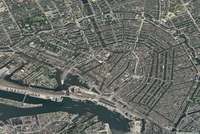1st CHEP Conference Bulletin
About CHEP

Computing in High Energy Physics (CHEP) is a major series of international conferences for physicists and computing professionals from the High Energy and Nuclear Physics community, Computer Science, and Information Technology. The CHEP conference provides an international forum to exchange information on computing experience and needs for the community, and to review recent, ongoing and future activities. Recent conferences were held in New York (USA) in 2012, in Taipei (Taiwan) in 2010, and in Prague (Czech Republic) in 2009.
CHEP 2013 is organised by Nikhef, the Dutch national institute for sub-atomic physics, in collaboration with partners. Details can be found at the conference website www.chep2013.org, or you can follow us on twitter.
Time table
| Call for Papers (2nd bulletin) | January 2013 |
| Registration and lodging bulletin | February 2013 |
| Abstract submission deadline | 25 March 2013 |
| Notification of acceptance | 24 May 2013 |
| Early bird registration ends | 28 June 2013 |
| Conference | 14 - 18 October 2013 |
Programme
"BiG Data Beyond Moore’s Law", coming to terms with Moore-less cores, ever increasing data volumes, and managing more resources without using more people. That's the theme of this CHEP Conference. With dedicated tracks on data acquisition, trigger and controls; event processing, simulation and analysis; distributed processing and data handling; data stores, data bases and storage systems; software engineering, parallelism & multi-core programming; and a track on facilities, production infrastructures, networking and collaborative tools.
The scientific program of CHEP 2013 will consist of plenary sessions with invited oral presentations, a number of parallel sessions comprising oral and poster presentations, and an industrial exhibition. The plenary sessions will occupy the five mornings of the conference and the parallel sessions will be held on 4 afternoons. Contributions are solicited in the form of abstracts and the Program Committee, with the help of the International Advisory Committee, will use these to finalize the program.
Conference Topics
In the call for papers, we are inviting contributions on the following topics:
- Data Acquisition, Trigger and Controls
- event building and farm networks; compute farms for high-level triggering; configuration and run control; describing and managing configuration data and conditions databases; online software frameworks and tools; online calibration procedures; remote access to and control of data acquisition systems and experimental facilities.
- Event Processing, Simulation and Analysis
- event generation, simulation and reconstruction; detector geometries, physics analysis; tools and techniques for data classification and parameter fitting; event visualization and data presentation; frameworks for event processing; toolkits for simulation, reconstruction and analysis; event data models.
- Distributed Processing and Data Handling
- grid computing; virtualization; infrastructure as a service; clouds; distributed data processing; data management; distributed analysis; distributed processing experience, including experience with grids and clouds; experience with production and data challenges; experience with analysis using distributed resources; interactive analysis using distributed resources; solutions for coping with a heterogeneous environment; mobile computing; monitoring of user jobs and data; grid and cloud software and monitoring tools; global usage and management of resources; middleware reliability, interoperability and security; experiment specific middleware applications.
- Data Stores, Data Bases, and Storage Systems
- storage management; local I/O and data access; mass storage systems; object dictionaries; event stores; metadata and supporting infrastructure; databases; access patterns and caching strategies; data preservation; data curation and long-term data reproducibility.
- Software Engineering, Parallelism & Multi-Core
- CPU/GPU architectures; tightly-coupled systems; GPGPU; concurrency; vectorization and parallelization; mathematical libraries; foundation and utility libraries; programming techniques and tools; software testing and quality assurance; configuration management; software build, release and distribution tools; documentation.
- Facilities, Production Infrastructures, Networking and Collaborative Tools
- basic hardware, benchmarks and experience; fabric virtualization; fabric management and administration; local and wide-area networking; private networks; collaborative systems: progress in technologies and applications; tele-presence and teleconferencing systems; experience in the use of teleconferencing tools.
Venue and Lodging
The conference will be held in the centre of Amsterdam in the historic heart of this UNESCO World Heritage city, surrounded by the famous canals.
A choice of hotels will be reserved for attendees, all of which are within easy reach of the venue either on foot (Amsterdam is a compact city) or accessible in a few minutes via the ubiquitous street car and metro network.
Travel
Amsterdam Airport (AMS) is a major European hub, serving 300 destinations worldwide, and host to most major airlines as well as many budget carriers. It also operates as a dual-hub system with Paris CDG through Air France-KLM, with several fights per hour between both airports. The airport is within easy reach of the city: a direct train leaving from the airport plaza links it to the inner city with a 15-min train ride, with services running 24 hours a day.
Social Activities
The Local Organizers invite all participants to the conference banquet on Thursday, October 17th. Entry is free to all paying CHEP attendees, tickets for accompanying persons can be purchased during the on-line registration process. No sessions are scheduled for Wednesday afternoon: you are invited to explore the nice and compact city, and the local organizers are pleased to help you enjoy the best Amsterdam has to offer!
Sponsoring and Booth Rental
Supporting CHEP delivers numerous benefits to sponsors depending on the desired level of visibility, priorities and goals. It is a rewarding marketing, business development and partnership opportunity, and gives your company access to the pool of IT experts from the physics community. Booth rental is also available for academic and research institutions at a reduced rate. Contact the local organizers for information on pricing.
Local Organizing Committee
CHEP2013 is organized by David Groep, Jeff Templon, Kors Bors, Wouter Verkerke, Gerhard Raven, Jos Vermeulen, Wim Heubers, Mieke Bouwhuis, Arjen van Rijn, and Joan Berger.
Contact
For more information please contact CHEP2013, Nikhef, P.O. Box 41882, NL 1009 DB Amsterdam, The Netherlands. Or by e-mail at info at chep2013.org.
Register at http://www.chep2013.org/registration to receive future bulletins and invitations.
 @chep2013
@chep2013



